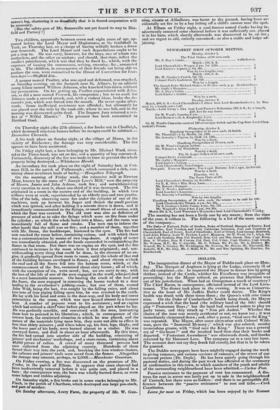On Thursday night (the 27th ultimo), a fire broke out
in Chudleigh, which destroyed nineteen houses before its ravages could be subdued.— Devonshire Chronicle.
A fire took place on Sunday night, at the village of Howe, in the vicinity of Rochester; the damage was very considerable. The fire appears to have been accidental.
On Friday night last, a barn belonging to Mr. Michael Ward, situa- ted at the Town-head, was set on fire, and a quantity of bay consumed. Fortunately, discovery of the fire was made in time to prevent the whole property being destroyed.— Whitehaven Herald.
An incendiary fire took place on the night of Saturday last, at Cot- more Hill, in the parish of Pulborough ; which consumed a rick, con- taining about seventeen loads of barley.—Hampshire Telegraph.
On the morning of Friday week, the extensive mill at Newton Moor, known by the name of" Joseph Lees's Mill," now the property of Messrs. James and John Ashton, took fire ; and notwithstanding every exertion to save it, about one-third of it was destroyed. The fire originated in a room in the eastern end of the building, in which two willows were at work, superintended by an elderly man and two youths. One of the lads, observing some fire under the cylinder of one of the machines, took up betwixt his finger and thumb the small portion which was ignited, and after holding it a minute threw it down, and it immediately communicated to the flyings, or small fibres of cotton, with which the floor was covered. The old man was also so deficient of presence of mind as to rake the flyings which were on fire from under the cylinder; on which the whole burst into a blaze, and the room was immediately full of flame and smoke. The men ran to inform the ether hands that the mill was on fire ; and a number of them, together with Mr. Stone, the bookkeeper, hastened to the spot. The fire bad now reached the room below, containing cotton, and with which there was a communication by means of two trap-doors. A supply of water was immediately obtained, and the hands succeeded in extinguishing the flames in that room. But there was no engine on the spot, and the fire continued to increase in the room where it first originated ; and, not- withstanding every thing that could be done, in the absence of an en- gine, it gradually spread from room to room, until the whole of that end of the building became enveloped in flames ; and about eleven o'clock the roof and all the floors fell into the bottom room, which, at the commencement of the fire, contained about sixty looms ; all of which, with the exception of six, were saved ; but, we are. sorry to say, with the loss of the life of one of the men engaged in the work, who perished in a most lamentable manner. On hearing the crash of the roof and the floors, the men engaged in removing the looms rushed to a door leading to the overlooker's jobbing-room; but one of them, named John Wild, being the last, was caught by the falling ruins, and .about two tons of iron piping falling upon him, be was crushed to the earth. He lay with his head and arms in the door-way, and his body and lower extremities in the room, which was now heated almost to a furnace heat. A number of persons went to his assistance; and an engine which had arrived a short time before played on the part where he lay. He was perfectly sensible, and conversed with the men, instructing them how to proceed in his liberation ; which, in consequence of the intense heat, the straitened situation in which he was placed, and the nature of the materials lying upon him, they were not able to effect in less than thirty minutes ; and when taken up, his feet, legs, thighs, and the lower part of his body, were burned almost to a cinder. He was conveyed home, and died in about an hour afterwards. By this time, the fire had spread into another side of the building, consisting of joiners' and mechanics' workshops, and a store-room, containing about 40,000 pieces of calico. A crowd of many thousand persons had now collected from the adjoining country. • Hundreds of them forced their way into the yard, and, breaking the iron window-frames, the calicoes and joiners' tools were saved from the flames. Altogether the damage may amount, perhaps, to 2,0001.—Manchester Guardian.
On Friday evening, a fire was discovered on the premises of Mr. Cooke, in the parish of Elham. It appears that some charcoal had been inadvertently removed before it was quite out, and placed in a barn ; the consequence was, the barn was wholly burned down, as were some lodges and stables adjoining. On Saturday night, a fire broke out in some stacks belonging to Mr. Finch, in the parish of Chartham, which destroyed one large pea-stack, and part of another.
On Sunday afternoon, Avery Farm, the property of Mr. W. Gun-
rowes's leg, shattering it so dreadfully that it is feared amputation will ning, situate at Allhallows, was burnt to the ground, having been ac- he necessary. cidentally set fire to by a boy letting off a child's cannon near the spot. [Has the safety-gun of Mr. Somerville not yet found its way to Hat- At Elham on Friday night, a coal-burner named Cooke having in- advertently removed some charcoal before it was sufficiently out, placed it in his barn, which shortly afterwards was discovered to be on fire ; and we regret to add, entirely consumed—as also a stable and lodge ad- joining.


























 Previous page
Previous page